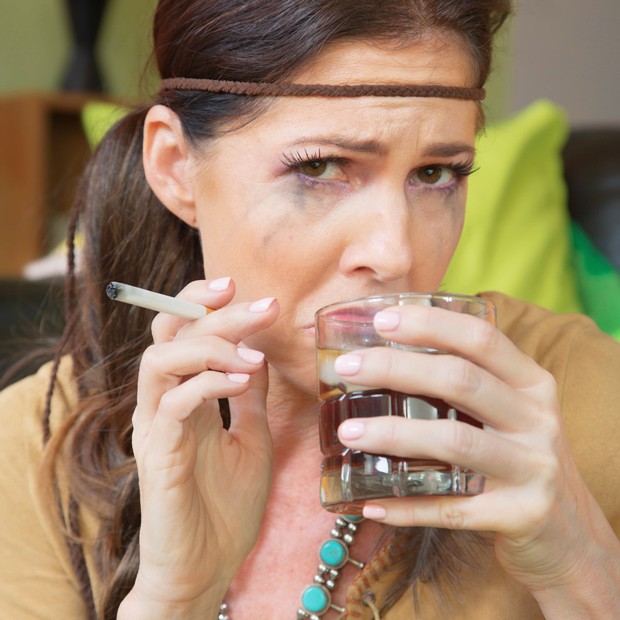“Depression” is not be confused with how you feel because you lost your stash of bubble hash, someone stole your nearly-ready-for-harvest plants, or you just dropped your $13,500 hand blown glass quad sherlock GOT “White Widow Walker” bong. Those all suck, but we aren't talking about being just being “bummed.”
As defined: “The persistent feeling of sadness or loss of interest that characterizes major depression can lead to a range of behavioral and physical symptoms... changes in sleep, appetite, energy level, concentration, daily behavior, or self-esteem. Depression can also be associated with thoughts of suicide.”
Suicide has been in the news all too frequently recently, from the sudden, shocking losses of Kate Spade and Anthony Bourdain, to a recent Centers for Disease Control and Prevention stat showing a 25 percent increase in suicides between 1999 and 2016, with Oregon seeing a 28.2 percent increase.
From 1999 to 2014, antidepressant use went up 65 percent and by 2014, nearly one in eight Americans age 12 or older had recently used an antidepressant. No, it’s not just you; we are a not happy country.
But as medical and recreational cannabis programs have led to expanded safe access, better education and adventures in self-medication, some people using antidepressants, and those seeking another path, are selecting cannabis. One Canadian study showed 63 percent of patients reported using medical marijuana as a substitute for prescription drugs such as opioids, sedatives and antidepressants.
Finding a particular cannabis strain to deal with depression is overwhelming. There are more varieties on shelves than ever, and it’s both a daunting and expensive undertaking task to try a dozen different flowers. (Or, my ideal weekend.)
“More balanced ratios (between 1:1 and 1:4) often are helpful for depression, while larger ratios (18:1 and higher) are exceptionally useful for anxiety and anxiety-causing disorders such as OCD [Obsessive-Compulsive Disorder]....(and) large amounts of high-ratio CBD can act as a depressant.” —Sara Payan
tweet this
To start, consider going beyond solely alleviating your depression, and seeking cannabis that helps with other conditions for which you are taking prescription medications. The Journal of the American Medical Association published a study this month concluding that one third of us take medications linked to feelings of depression in users, as a side effect or interaction. They found users of over 200 common drugs, for things including treating acid reflux, high blood pressure, anxiety, beta blockers, pain (including ibuprofen), high blood pressure and anticonvulsant medications, are more likely to be depressed, and those taking three of the drugs were three times as likely to be depressed. If you can find a cannabis replacement, you may be removing a potential cause of your depression.
When seeking specific relief from depression, start with what’s in the flower, and not what it’s named (or commonly misnamed), by looking for terpenes, not just THC count. Seek out strains or products with high levels of beta caryophyllene (β-caryophyllene) and limonene. Beta caryophyllene imparts a stimulating, uplifting effect, while limonene has a citrusy scent and taste, with mood-boosting properties.
“Uplifting” is frequently attributed to sativa strains, and limonene is most often found in sativa-dominant strains such as Tangie Dream, Super Lemon Haze and Durban Poison. Beta caryophyllene has a spicy, pepperish nose, and is often found in strains including OG Kush, Skywalker Kush and Sour Diesel.
Bear in mind that strains recommended for anxiety are often dominant in terpenes that bring on a couch-locking, firing squad effect on motivation, which, while great for relaxation, may not be best for depression where motivation is in short supply.
CBD is often sought out for its non-psychotropic effects, but works best for many when introduced into the system with at least a 1:1 ratio of CBD and THC. Cannabis Educator Sara Payan writes: “More balanced ratios (between 1:1 and 1:4) often are helpful for depression, while larger ratios (18:1 and higher) are exceptionally useful for anxiety and anxiety-causing disorders such as OCD [Obsessive-Compulsive Disorder]....(and) large amounts of high-ratio CBD can act as a depressant.”
Cannabis is a tool, but it's not the only one. If you’re feeling depressed, reach out and know you aren’t alone.
Deschutes County Health Services 24-Hour Crisis Hotline: 541-322-7500, ext. 9.
National Suicide Prevention Lifeline: 1-800-273-TALK (8255) or visit suicidepreventionlifeline.org.








